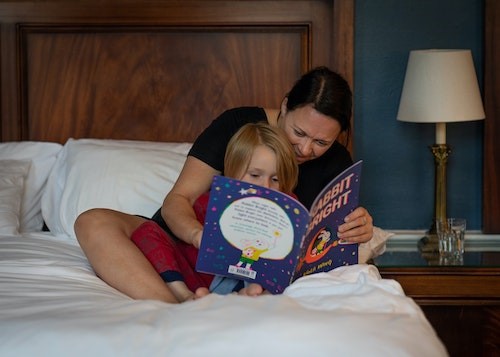Top Tips To Help Your Child Get A Better Night’s Sleep
Does your child struggle to get to sleep, have trouble staying in bed throughout the night or refuse to sleep on their own? There are many common sleep-related issues for parents to consider when it comes to their little ones getting a good night’s rest. From separation anxiety to problems at school or using tech before bed, modern life can pose a challenge when it comes to your child's sleep routine.

So, keep reading as we explore easy ways you can help tackle childhood insomnia and keep their bedtime woes at bay…
Children go through a faster learning curve and growth rate than any other age group until they reach physical maturity. Their bodies work faster and harder than others do until their bodies are considered adult, so it makes sense they’d need more good quality sleep and rest, right?
How much sleep do kids need?
The Sleep Charity suggests that the younger they are, the more sleep they’ll need. A good rule of thumb is:
- 12-14 hours for those aged 0-5 (including naps)
- Between 8-11 hours for those aged up to 18
What stops a child from sleeping well?
A lot of kids have sleeping problems. It could be wetting the bed, anxiety and separation, nightmares, child insomnia and more, but sleep disruption in children is common.
Symptoms of poor or insufficient sleep in Children
- They’re difficult to wake up in the morning.
- They fall asleep and take naps throughout the day.
- They’re irritable, grumpy or have difficulty concentrating.
- They have little interest in learning.
- They sleep in late on weekends to ‘catch up’.

Top Tips To Help Your Child Get A Better Night’s Sleep
Getting good quality sleep is a huge plus since it helps our bodies relax, recover and function from our head to our toes. This is essential for fast-growing youngsters to help them continue to develop at a healthy rate. Of course, getting good quality sleep is easier said than done when there are temptations like unhealthy snacks, TVs and smart devices all around and distractions on every corner, but there are things you can do to help your child sleep better.
- Help them get into a routine
Our bodies have something called the Circadian Rhythm. This ‘body clock’ likes routine and uses daylight to create a natural rhythm. You can help your child by setting a bedtime where their bedroom lights need to go off and giving them an alarm for the morning.
- Turn off their devices
Blue light from screens and devices has been said to impact your melatonin production and sleep quality. It’s a kind of light pollution that confuses your body clock and makes it harder for you to create sleep-inducing melatonin. And since they’re still developing and growing, it could impact your child’s sight as well.
It’s probably a good idea to avoid any devices or screens before bed. Aim to get your kids to go screen-free at least 30 minutes before bedtime and instead try reading books or playing with cuddly toys.
- Be a role model
Kids copy their parents, it’s one of their key forms of learning before formal education, so what you’re doing can have a direct impact on their behaviour. So, how about you put the phone down before their bedtime, read a book instead and start to overact healthy bedtime habits so they’ll imitate you?
- Prep to avoid nightmares and night terrors
Nightmares or Night Terrors are common in younger children between the ages of three and eight. They’re usually caused by them being overtired, being scared before bed or disrupted sleep, but other things like medicines, medical conditions and mental health issues can cause them too.
The best way to combat nightmares is to avoid scary or stressful activities before bedtime and put a calming, relaxing bedtime schedule in place. And for those who have night terrors, it's recommended that you stay with your child until they’re calm. Don’t touch, move or wake them unless they’re about to hurt themselves.
Nightmares and night terrors usually go away on their own, so just be patient and calm.

- Don’t give in to separation anxiety
Toddlers are incredibly susceptible to separation anxiety which can result in a turbulent bedtime routine and disrupted sleep. It’s really common, and the main thing parents can do is be patient, but there are other things to try:
- Give your child something to remind them of you for their room
- Don’t go at the first cry, wait and see if they can self-soothe first
- Don’t let them sleep in your bed
- Try and soothe them from a distance
- Teach them good toilet habits
Bedwetting is a messy but common issue for young children. It could be the result of drinking too much before bed, stress or just not feeling the urge until too late, but it’s not something to be ashamed of or punish them for. To help your child overcome their worry and bedwetting, try a few of these:
- Use waterproof mattress and duvet covers
- Make sure they know where the toilet is
- Make sure they go regularly
- Give them plenty to drink during the daytime
- Encourage exercise for healthy sleep
Exercise is key to a healthy, happy child and their sleep quality. Research shows that children who are more active during the daytime fall asleep faster than those who are more sedentary. So, why not encourage them to run around and play in the garden or head to the playground instead? Playground companies work hard to create equipment that is designed to challenge children and boost their mental and physical development, so it could be ideal for helping them sleep better overall.
- Improve their sleep hygiene
Sleep hygiene is important for helping us all fall asleep and sleep well. A lot of good sleep hygiene habits are mentioned above, like routines, bedtimes, screens, and exercise, but there are things you can do to their bedroom too:
- Keep the room at a comfortable temperature of around 20°C
- Use blackout curtains and dimming lights
- Consider using soothing scents like lavender
The idea is to create a calm, distraction-free space where their body clocks can get to work without distractions.
Children have many sleep issues, but they’re rarely untreatable, so pay attention to how they’re behaving, set out some healthy boundaries and routines, and see if you can help them sleep better.